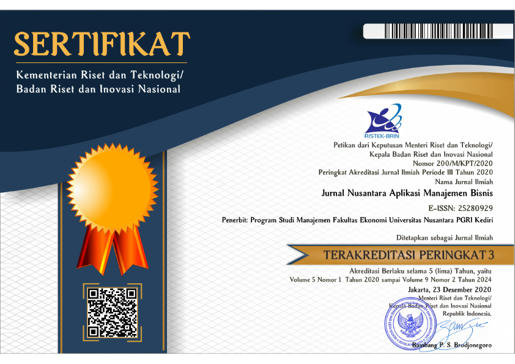Analisis Gamification Shopee.com Sebagai Media Pemasaran Terhadap EWOM, Positive Emotion, & Repurchase Intention (Pada Aplikasi Shopee.com)
DOI:
https://doi.org/10.29407/nusamba.v6i1.14630Keywords:
EWOM, Positive Emotion, Repurchase Intentions, Loyalty Program, StartUpAbstract
This study aims to explore the influence of Shopee.com gamification as a marketing media for EWOM, positive emotion, and repurchase intention. Researchers emphasize on Shopee as one of the e-commerce that is first ranked with the number of monthly web visitors, and first ranked on the Appstore and Playstore in Indonesia. This study uses a questionnaire distributed online to 170 respondents, with criteria as the "Y" generation, and has used Shopee and has the experience to use the loyalty games program of the Shopee.com application. The results of this study were further processed and analyzed with the Structural Equation Modeling (SEM) statistical technique with the smartPLS 3.0 program. The results showed that Shopee.com gamification had a positive effect on positive emotion, repurchase intentions, and electronic word of mouth (EWOM). Then positive emotion has a positive effect on repurchase intentions and electronic word of mouth (EWOM).
Downloads
References
Abdul Rahman, M. H., Ismail Yusuf Panessai, I., Mohd Noor, N. A. Z., & Mat Salleh, N. S. (2018). Gamification Elements and Their Impacts on Teaching and Learning – a Review. The International Journal of Multimedia & Its Applications, 10(06), 37–46. https://doi.org/10.5121/ijma.2018.10604
Bagozzi, R. P., Gopinath, M., & Nyer, P. U. (1999). The role of emotions in marketing. Journal of the Academy of Marketing Science, 27(2), 184–206. https://doi.org/10.1177/0092070399272005
Belch, E. George, Belch, A. M. (2003). Communications Integrated Marketing. In McGraw- Hill. New York.
Burns, A. C., & Ronald F. Bush. (1958). Marketing research. Aslib Proceedings, 10(11), 283– 293. https://doi.org/10.1108/eb049676
Hartini, S., Mardhiyah, D., & Sukaris, S. (2020). Determinant of E-WOM : Popularity Destination , Value and Conspicuous Tendency regarding Adventure Tourism. International Journal of Innovation, Creativity and Change, 11(1), 539–560.
Hawkins & Mothersbaugh. (2016). Consumer Behavior:Building Marketing Strategy.
Hellier, P. K., Geursen, G. M., Carr, R. A., & Rickard, J. A. (2003). Customer repurchase intention. In European Journal of Marketing (Vol. 37). https://doi.org/10.1108/03090560310495456
Hill, C. L. M., & Updegraff, J. A. (2012). Mindfulness and its relationship to emotional regulation. Emotion, 12(1), 81–90. https://doi.org/10.1037/a0026355
Hofacker, C. F., de Ruyter, K., Lurie, N. H., Manchanda, P., & Donaldson, J. (2016). Gamification and Mobile Marketing Effectiveness. Journal of Interactive Marketing, 34(July), 25–36. https://doi.org/10.1016/j.intmar.2016.03.001
iprice.co.id. (2020). Peta E‑Commerce Indonesia. Retrieved April 29, 2020, from https://iprice.co.id/insights/ mapofecommerce/ website: https://iprice.co.id/insights/mapofecommerce/
Joseph F. Hair, J., Black, W. C., J.Babin, B., & Anderson, R. E. (2017). Multivariate Data Analysis (MVDA). In Pharmaceutical Quality by Design: A Practical Approach. https://doi.org/10.1002/9781118895238.ch8
Joseph F. Hair, J., Hult, G. T. M., Ringle, C. M., & Marko Sastedt. (2013). A Primer on Partial Least Squares Structural Equation Modeling. In Long Range Planning (Vol. 46). https://doi.org/10.1016/j.lrp.2013.01.002
Kang, J. H., & Jin, B. (2015). Positive Consumption Emotion to Purchase Intention Cross- Cultural Evidence from China and India. 655–658. https://doi.org/10.1007/978-3-319- 10912-1_210
Kitchathorn, P. (2006). Factor Influencing Customer Repurchase Intention : An Investigation of Switching Barriers that Influence the Relationship between Satisfaction and Repurchase Intention in the Low Cost airlines Industry in Thailand. 1–22.
Kotler, P., & Keller, K. L. (2016). Marketing Management Global Edition (Vol. 15E). https://doi.org/10.1080/08911760903022556
Laudon, K. C., & Laudon, J. P. (2014). Management Information Systems Managing The digital Firm Thirteen Edition Global Edition (SIB) (13TH EDITI; S. Wall, B. Horan, &
A. Bradbury, Eds.). Pearson Education Limited.
Lazzaro, N. (2004). Why We Play Games: Four Keys to More Emotion Without Story. Game Developer Conference (GDC), 1–8. https://doi.org/10.1111/j.1464-410X.2004.04896.x
Morissan. (2012). Buku Metode Penelitian Survei. Jakarta: Prenadamedia Group.
Notoadmojo, S. (2010). Metodologi Penelitian Kesehatan (Buku). Jakarta: Rineka Cipta.
Oblinger, D. G., & Oblinger, J. L. (2005). Is it Age or IT: First Steps Toward Understanding the Net Generation. In D.G. Oblinger und J.L. Oblinger (Hrsg.), Educating the Net Generation. (S. 2.1-2.20). Educating the Net Generation, 2(1-2), 20. Retrieved from https://www.educause.edu/research-and-publications/books/educating-net-generation/it- age-or-it-first-steps-toward-understanding-net-generation
Oliver, R. L. (2003). Satisfication : A Behavioral Perspective on the Consumer. https://doi.org/10.16309/j.cnki.issn.1007-1776.2003.03.004
Sears, A., & Jacko, J. A. (2008). The Human-Computer Interaction Handbook : Fundamentals, Evolving Technologies, and Emerging Applications. Human Factors and Ergonomics. https://doi.org/10.1201/9781410615862
Serra-Cantallops, A., Ramon-Cardona, J., & Salvi, F. (2018). The impact of positive emotional experiences on eWOM generation and loyalty. Spanish Journal of Marketing - ESIC, 22(2), 142–162. https://doi.org/10.1108/SJME-03-2018-0009
Wang, L., Gunasti, K., Gopal, R., Shankar, R., & Pancras, J. (2017). The Impact of Gamification on Word-of-Mouth Effectiveness: Evidence from Foursquare. Proceedings of the 50th Hawaii International Conference on System Sciences (2017), 743–752. https://doi.org/10.24251/hicss.2017.090
Yang, Y., Asaad, Y., & Dwivedi, Y. (2017). Examining the impact of gamification on intention of engagement and brand attitude in the marketing context. Computers in Human Behavior, 73, 459–469. https://doi.org/10.1016/j.chb.2017.03.066
Zikmund, W. G., J.Babin, B., C.Carr, J., & Mitch Griffin. (2013). Business Research Method, 9th edition. 417.
Downloads
Published
Issue
Section
License
Authors who publish with this journal agree to the following terms:
- Copyright on any article is retained by the author(s).
- The author grants the journal, the right of first publication with the work simultaneously licensed under a Creative Commons Attribution License that allows others to share the work with an acknowledgment of the work’s authorship and initial publication in this journal.
- Authors are able to enter into separate, additional contractual arrangements for the non-exclusive distribution of the journal’s published version of the work (e.g., post it to an institutional repository or publish it in a book), with an acknowledgment of its initial publication in this journal.
- Authors are permitted and encouraged to post their work online (e.g., in institutional repositories or on their website) prior to and during the submission process, as it can lead to productive exchanges, as well as earlier and greater citation of published work.
- The article and any associated published material is distributed under the Creative Commons Attribution-ShareAlike 4.0 International License












